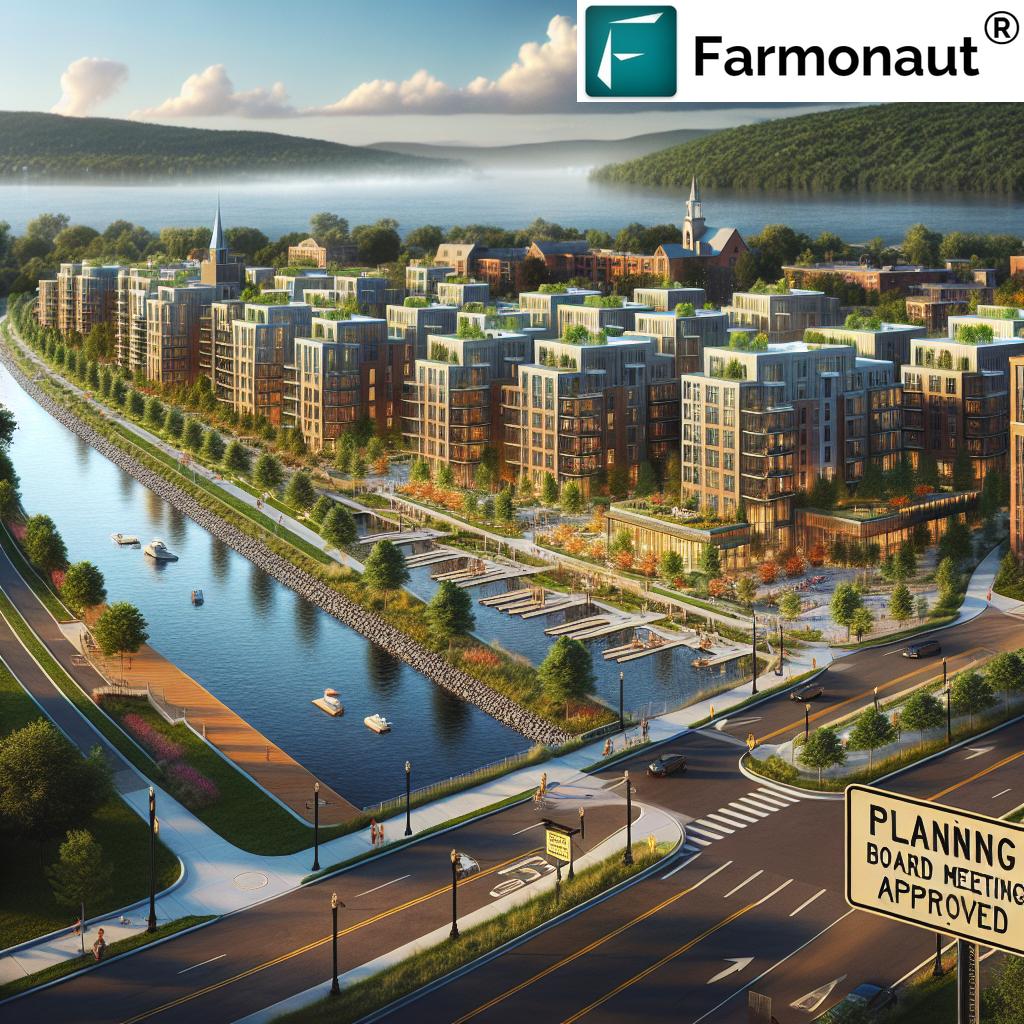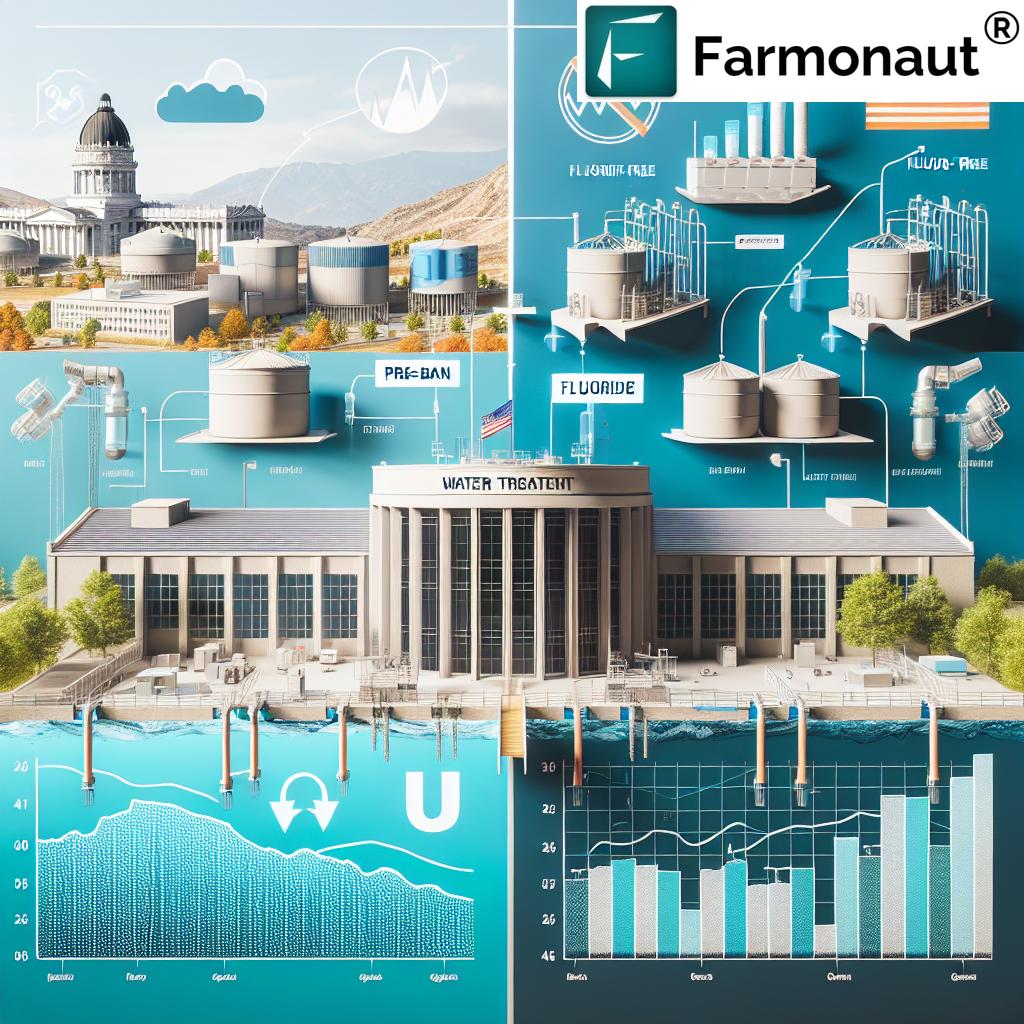Ithaca Planning Board: Top 5 Exciting Residential Projects Approved
“Ithaca Planning Board approved over 400 new residential units in Collegetown developments in 2024.”
Table of Contents
- Introduction: The Changing Face of Ithaca Urban Development
- Project Comparison Table: Top 5 Approved Residential Projects
- 1. 201 Oak Avenue: Mixed-Use Building Plans in Collegetown
- 2. Water’s Edge: Major Waterfront Zoning and Site Plan Approval
- 3. 215 College Avenue: Apartment Construction Approvals in Collegetown
- 4. INHS West State Street: Affordable Senior Housing Projects
- 5. Accessory Dwelling Unit Regulations: Enhancing Housing Options
- Midpoint Trivia
- Ithaca Planning Board Trends: Zoning, Environmental Review, and Sustainability
- Precision Agriculture Insights with Farmonaut
- FAQ: Ithaca Planning Board & Residential Development
- Conclusion: Ithaca’s Bright Residential Future
Introduction: The Changing Face of Ithaca Urban Development
In 2024, the Ithaca planning board has been at the epicenter of a transformative period in our city’s residential development landscape. As Collegetown development projects progress rapidly, new site plan approval process methods and waterfront zoning Ithaca trends are reshaping our neighborhoods, commerce, and quality of life. This blog brings you an in-depth look at the top five most exciting residential projects that have been approved, showcasing both the details and broader patterns influencing Ithaca urban development.
From innovative mixed-use buildings and the revitalization of historical avenues, to substantially expanded affordable housing and new proposed residential units Ithaca, let’s examine how planning board decisions are driving positive, sustainable and inclusive growth for all.
Whether you are a resident, investor, local developer, architect, or just passionate about city planning, this is your essential guide to Ithaca’s most impactful recent developments — grounded firmly in the official Ithaca planning board agenda and meetings.
Project Comparison Table: Top 5 Approved Residential Projects by Ithaca Planning Board
| Project Name | Location | Estimated Number of Residential Units | Project Type | Site Plan Approval Date | Estimated Completion Year | Notable Features |
|---|---|---|---|---|---|---|
| 201 Oak Avenue | Collegetown Oak Ave |
52 | Mixed-use (Residential + Retail) | June 2024 | 2026 | Ground-floor Koko restaurant, fitness center, rooftop deck, code-compliant fire access |
| Water’s Edge | Ithaca Waterfront Third St |
200 | Mixed-use (Residential + Retail) | June 2024 (pending revised approval) | TBD | Market-rate & affordable housing, micro-retail, compliant with new waterfront zoning Ithaca, environmental remediation |
| 215 College Avenue | Collegetown College Ave & Linden Ave |
91 | Residential Apartments | Lead Agency Declared June 2024 | TBD | 7 stories, rooftop terrace, public plaza, design harmony with adjacent buildings |
| INHS West State Street Senior Housing | West State St Downtown |
56 | Affordable Senior Housing + Daycare | June 2024 (Lead Agency Declared) | TBD | Passive House Certification, on-site daycare, community rooms |
| Accessory Dwelling Unit (ADU) Regulation | City-Wide | Policy (Enables 1 ADU per lot) | City Regulation | 2024 (Under Review) | Ongoing | Clear regulatory path for ADUs, intergenerational & flexible housing |
1. 201 Oak Avenue: Mixed-Use Building Plans in Collegetown
The 201 Oak Avenue project stands as a model for the future of Collegetown development projects. This major proposal, led by local developers Nick Robertson and Charlie O’Connor, received final site plan approval after an extensive, multi-stage review process by the Ithaca planning board. Let’s break down the plan and its significance for the city:
Project Details & Features
- Location: Corner of Collegetown at Oak Avenue
- Type: New eight-story mixed-use building
- Size: 37,551 square feet
- Residential Units: 52 apartments (studios to 4-bedrooms; 95 total beds)
- Commercial Space: 1,500 square feet (ground floor, new home for Koko restaurant)
- Resident Amenities: Modern lobby, fitness center, private rooftop deck
- Fire Access & Code: Addition of a second stairwell to meet state fire code brought a significant change to the south facade and floor plans
Planning Board Discussion & Approval
During the meeting, board members offered strong support for the project and its tenant mix. Andy Rollman, a board member, remarked:
“I’m very excited to see the building get built, and the tenant you’re allowing to come into the building. I think this will be a great addition to the city.”
The demolition of the original Koko restaurant was already underway at the time of approval, paving the way for construction to potentially finish by August 2026. The Ithaca planning board’s swift, positive vote on the 201 Oak Avenue plan demonstrates the city’s commitment to revitalizing Collegetown through thoughtful, code-compliant, and commercially diverse projects.
Key SEO takeaway: This mixed-use building plans Ithaca story sets a precedent for integrating retail, amenities, and housing in high-density neighborhoods, all through a rigorous site plan approval process.
For more on real-time, data-driven urban planning and land use analysis, see how Farmonaut’s large-scale farm management platform powers precise decision-making in agricultural and environmental spaces.
2. Water’s Edge: Major Waterfront Zoning and Site Plan Approval
Another prominent project advancing via the Ithaca planning board is the Water’s Edge development — a shining example of how waterfront zoning Ithaca policies are shaping the next wave of urban living spaces.
Project Quick Facts
- Location: Ithaca Waterfront, Third Street area
- Units: 200 apartments (compared with 450 in the original proposal, reflecting fire access constraints; 160 market-rate & 40 affordable units in two buildings)
- Retail: 1,000 sq ft (micro-retail and amenity spaces)
- Parking: 210 spaces (with a ratio above 1:1 per unit, a key concern for adjacent market operations)
- Green Infrastructure: Enhanced street trees, connections to Waterfront Trail, and new lawn/terraced landscaping
- Compliance: Fully meets updated zoning rules; no variances needed
- Environmental Review: Focused on remediating contaminated soil (petroleum and VOCs) — board requested detailed interim management plan for undeveloped northern section
Discussion and Community Input
The Water’s Edge proposal received positive feedback from both the board and the public, especially the Ithaca Farmers Market which highlighted the project’s strong “synergy” with market visitor needs, access, and parking. The project further strengthens the city’s capacity to deliver proposed residential units Ithaca along the river, satisfying demand for both affordable and market-rate apartments.
A key topic at the meeting was environmental stewardship. Soil contamination, inherited from a Department of Transportation fuel station and road paint storage, was addressed through a plan for excavation, remediation, installation of vapor barriers, and further investigative sampling. No residences are permitted on the ground level, adding an extra layer of safety.
This site plan approval process illustrates how progressive, adaptive zoning policies and proactive development teams are working together to enliven the Ithaca waterfront for all.
Planning large, multi-phase projects? Farmonaut enables fleet management for monitoring productivity and resources over expansive properties — see more: fleet and resource management for agriculture & agri-businesses.
“Waterfront zoning changes in Ithaca enabled 3 major residential projects to receive site plan approval this year.”
3. 215 College Avenue: Apartment Construction Approvals in Collegetown
Continuing the Collegetown development projects trend, the 215 College Avenue site represents the ambition of local developers to reimagine traditional housing corridors while navigating strict site and zoning guidelines.
Highlights at a Glance
- Location: College Avenue & Linden Avenue (significant change in ground elevation across the lot)
- Development: Demolition of an existing 130-year-old apartment house, construction of a new 7-story residential building
- Residential Units: 91 ranging from studios to 3-bedroom apartments (total: 158 beds)
- Amenity Space: 3,168 sq ft, plus a 1,797 sq ft rooftop terrace
- Community Benefit: Inclusion of a new public plaza, extensive landscaping, and distinctive design harmonized with historic neighboring structures
- Process: Requires variances, aligns with Collegetown Design Guidelines, undergoing site plan and SEQR (State Environmental Quality Review) process — agency status declared by board
Board Feedback and Urban Design
- The board appreciated the building’s dual-frontage response to College Avenue (urban, large-scale) vs. Linden Avenue (residential, lighter color palette, wood accents), blending new with existing streetscapes.
- Calls were made to document or preserve elements of the historic apartment house to be demolished and to ensure public realm enhancements (renderings from street views, larger community spaces).
- Varied perspectives, such as critique over the “V” support column for aesthetic reasons, highlight the in-depth architectural discussion common to the Ithaca planning board process.
The 215 College Avenue project is among the most closely watched for its challenging lot, ambitious density, and potential to set new standards in apartment construction approvals.
For comprehensive project monitoring, leverage Farmonaut’s carbon footprint tracking – ideal for responsible property managers and local governments looking to measure and reduce environmental impact across large operations.
4. INHS West State Street: Affordable Senior Housing Projects
One of the most impactful affordable senior housing projects reviewed this year is the INHS West State Street proposal from Ithaca Neighborhood Housing Services. This initiative aims to bring dignified housing and essential services to lower-income seniors, while also providing a new daycare amenity in downtown Ithaca.
Key Components
- Location: 200 block of West State Street (205 & 209-217 W. State), downtown core
- Project Scope: 5-story, 65,500 sq ft building replacing the recently vacated Family Medicine Building and parking lot
- Residential Units: 56 one-bedroom lower-income senior apartments (four upper floors)
- Daycare: Ground floor, three-classroom daycare (west side, separate entrance)
- Parking: 12-car lot (one-way, along southern property edge)
- Amenity Spaces: Community room, lobby, covered playground with protective lighting and container landscaping
- Sustainability: Targeting Passive House certification (state-of-the-art insulation, energy-efficient design, vapor barriers, high window-to-wall ratios)
- Zoning: Flexible Urban Center; no variances needed; requires lot consolidation
Sustainability, Design, and Board Review
- The team’s presentation focused on retaining mature street trees through careful site planning and paver choice, providing a visually active and green edge along the streets.
- Board members suggested expanding the playground by reducing parking, and explored potential food service options for residents.
- The facade will feature ground-floor brick, striated neutral-toned metal paneling (providing both contemporary appeal and durability), and communal balconies on the east.
- The Ithaca planning board declared itself Lead Agency for environmental review quickly and unanimously, paving the way for an expedited grant application.
For chain-of-custody management and product origin tracking in large institutional or community meal programs, see Farmonaut blockchain-enabled product traceability solution — supporting trust and transparency in distribution of local agricultural goods.
5. Accessory Dwelling Unit Regulations: Enhancing Housing Options Citywide
Sometimes the most far-reaching housing policies are not a single building, but a change in how a whole city manages its residential lots. The proposed accessory dwelling unit regulations represent such a sea-change for Ithaca urban development.
- ADU Rules: One ADU per property, up to 2 stories and 800 sq ft (new construction footprint), 2-bedroom maximum
- Ownership: ADUs cannot be sold separately from principal property
- Compliance: New ADUs must follow modern setbacks; repurposed outbuildings are grandfathered in; no separate utility meters required
- Permits/Process: Clear, well-defined application process developed by planning staff; schematic prototype designs being developed to illustrate compliance and streamline homeowner understanding
This straightforward regulatory framework promises to add hundreds of additional proposed residential units Ithaca-wide by enabling garage, basement, and secondary housing upgrades—fostering flexibility for multigenerational, workforce, and affordable living spaces.
The Ithaca planning board praised plans for model drawings and suggested engaging Cornell Architecture students to imagine best-practice examples. Enthusiasm was universal: ADUs will support intergenerational living, add value to existing homes, and fill a crucial “middle-income” gap in the market.
Ready to visualize and analyze lot-level changes? Farmonaut’s API offers access to up-to-date satellite and weather data for urban planners and research teams, with full developer docs here.
Farmonaut Subscriptions: Affordable Precision Agriculture for All
Farmonaut empowers decision-makers across property types. Choose the subscription tier that fits your monitoring, traceability, or planning needs:
Ithaca Planning Board Trends: Zoning, Environmental Review, and Sustainability
Collectively, these five site plan approval process cases illustrate how the Ithaca planning board is adapting policy and procedures to enable both large developer-led projects and grassroots, homeowner-driven improvements. Notable industry trends include:
- Responsive Zoning Updates: New waterfront zoning guidelines have unlocked several major developments, streamlining the path for compliant mixed-use projects near the Ithaca Farmers Market while maintaining open space requirements and access
- Environmental Integrity: Robust focus on ground soil remediation, vapor barriers, and avoiding residential use on contaminated levels demonstrates proactive public health planning
- Sustainable Design: Multiple projects are targeting Passive House certification, high-efficiency envelopes, and expanded urban tree canopies
- Participation: From public comment periods to board-recommended partnerships with Cornell design students, there is a spirit of inclusivity in the review process
Each of these trends contributes to making Ithaca’s urban development more resilient, flexible, and responsive to resident and market needs for decades to come.
Precision Agriculture Insights with Farmonaut
As Ithaca shapes its residential landscape through bold development and innovative zoning, precision technology and sustainable practices are just as crucial in the rural and agricultural spaces surrounding the city.
Farmonaut provides affordable, scalable, satellite-based farm management solutions for farmers, agribusinesses, research centers, and governments—transforming traditional agriculture into a data-driven, efficient, and sustainable industry.
- Satellite Crop Health Monitoring: Multispectral imaging, AI-powered advisory, and real-time field data help optimize crop yields, irrigation, and resource use—analogous to smart urban planning but for rural spaces.
- Blockchain Traceability: Secure, transparent food supply chains from farm to fork, boosting consumer trust and institutional accountability.
- Fleet & Resource Management: Tools for plantation tracking, vehicle/asset optimization, and carbon footprinting—essential for farm managers or anyone overseeing large land-based operations.
- Farmer-Focused API Access: Developers and planners can integrate Farmonaut’s satellite, weather, and crop data into their own GIS or decision-support applications quickly (API docs).
- Sustainability At Scale: Easy-to-access monitoring lets both individual farmers and major institutions track impacts and sustainability metrics for compliance and continual improvement.
Try Farmonaut Web, Android, or iOS apps for real-time insights, or visit our product pages:
- Carbon Footprinting: Monitor environmental impact, meet regulatory demands, and improve ecosystem services.
- Product Traceability: Ensure transparent food and agri-product supply chains.
- Fleet Management: Track and optimize your agricultural equipment operations seamlessly.
Frequently Asked Questions: Ithaca Planning Board & Residential Development
What is the Ithaca Planning Board’s role in new residential development?
The Ithaca Planning Board oversees the site plan approval process for all major developments, ensuring projects comply with city zoning, environmental, transportation, and design requirements. The board also coordinates public input and environmental reviews for sustainable urban planning.
What are mixed-use building plans Ithaca?
Mixed-use building plans in Ithaca combine residential units (such as apartments, studios, or affordable housing) with commercial or retail spaces in a single development, promoting vibrant, walkable neighborhoods and efficient land use.
What is new in Ithaca’s waterfront zoning?
The waterfront zoning Ithaca was updated to encourage residential, retail, and public-use developments. These changes simplified project compliance, increased allowable unit density, and ensured accessibility to green spaces and trails, all while safeguarding waterfront environmental quality.
How do accessory dwelling unit regulations impact homeowners?
New accessory dwelling unit regulations now give homeowners a clear process to create legal in-law apartments, convert garages, or add backyard cottages with well-defined size, height, and setback rules—expanding affordable, flexible housing options citywide.
Are there incentives for sustainable or affordable housing projects?
Yes, sustainable developments (such as Passive House or those that include affordable housing elements) may access city, state, or grant-based incentives, provided they align with approved site plan and zoning requirements.
How do I monitor or analyze land changes, construction, or agriculture in Ithaca?
Leverage Farmonaut’s satellite-based monitoring tools and APIs for real-time land, crop, or environmental observations—ideal for developers, planners, researchers, and property managers.
Conclusion: Ithaca’s Bright Residential Future
The Ithaca planning board‘s recent approvals and ongoing urban development efforts signal a vibrant, inclusive, and forward-thinking city. By advancing innovative Collegetown development projects, enabling high-density living, ensuring affordable senior housing, remediating legacy environmental issues on the waterfront, and making it easier for homeowners to add accessory units, Ithaca is building a city that works for all residents.
Supported by cutting-edge solutions like Farmonaut in agriculture and environmental monitoring, our region is well positioned to thrive both economically and ecologically. We look forward to seeing these residential projects take shape—and to sharing further news and industry trends as the city’s landscape continues to evolve.
Stay tuned for more updates on all things Ithaca urban development and innovation!



















